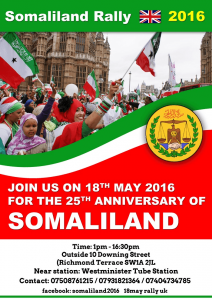There are three letters every Zimbabwean knows, though most were not born at the time.
On 11 November 1965, Rhodesian prime minister Ian Smith made a unilateral declaration of independence or UDI, severing ties with Britain.
It was the first such move since George Washington did the same in 1776, proclaiming the United States free from London, and Smith would later joke that, “in 200 years the British sense of humour hadn’t improved.â€
Rhodesia was beset by problems of race and discrimination but, nearly 4000 kilometres from Harare, another UDI has produced the most democratic country on the Horn of Africa.
Welcome to Somaliland and its harbour city of Berbera that could soon become one of the most strategic ports in the world.
In colonial times the Somalis fared badly with their territory snatched by Italy, France and Britain, some snapped up by Kenya, a stretch given to Ethiopia and clans and families divided by borders drawn in Europe.
Unhappy marriage
Berbera was part of British Somaliland which, at independence in 1960, merged with the Italian bit to make an ill-fated marriage called Somalia. When that collapsed, the English-speaking Somalilanders declared UDI, reasserting their sovereignty with a capital in the largest city, Hargeisa.
As with Rhodesia, no country has granted formal recognition.
Move around Somalia and there are weapons aplenty, yet you rarely see a gun in Somaliland. It’s been a working democracy since the break, with a press more free than any of the nearby states.
And it’s a tough neighbourhood.
To the west is Ethiopia, a regime that trucks no dissent and has been landlocked since Eritrea broke away in 1991. For them, Somaliland with its warm-water port at Berbera has been a lifeline.
East lies the rest of Somalia, slowly putting a government back together and still set on reunification with Hargeisa, though this is about as likely as Zambia, Zimbabwe and Malawi joining in a modern Federation of Rhodesia and Nyasaland.
And to the north is the reason Berbera – now a working port with all the infrastructure – is getting so much attention.
Rival to Djibouti
Djibouti, the former French Somaliland, has been the stop of choice for ships sailing from the Indian Ocean through the Rea Sea to Suez. France, China and the US have military bases there, but an erratic President Ismaïl Guelleh and serious issues on human rights make the future anything but certain.
Earlier this year Guelleh was re-elected for a fourth term even though the constitution has a limit of two. He won 87 per cent of the vote amid howls from the opposition who claim the poll was rigged and that soldiers cast multiple ballots.
Guelleh’s rivals are mostly in jail or in exile.
Berbera is right next door to Djibouti, on the sea-lane to Suez, with lower tariffs, a stable government, no dictator and a need for friends if the country is to win recognition.
Until 1941, Berbera was capital of the British protectorate and before the English it had been sacked by the Portuguese, then forced into the Turkish empire.
The beach is a postcard from paradise, sea warm as a tepid bath, camels strolling on the sand, and hardly any tourists.
But that could change. Hotels have opened up, there’s an airport with flights from Hargeisa and Nairobi.
Walk the once empty dock, and ships are unloading or taking on supplies at a new terminal built last year.
Now a Dubai firm, DP World has won a contract to manage the port. The company has been sued by Djibouti where they also run shipping, amid claims that DP had taken bribes. The charge was thrown out earlier this year by a court in London
The problem for Djibouti is that DP World now has an alternative just down the way and, too much pressure could see them move and take the shipping with them.
But what if Somaliland is recognized as a sovereign state? There is a lobby for this in Washington where the military has worried about the future of its base in Djibouti.
Somaliland is English speaking and the Pentagon would be alone here, without French and Chinese rivals.
And the US already has military links with a country it doesn’t recognise, underwriting the safety of Taiwan even though Beijing claims the island as its own.
Boom times
For all its problems, Rhodesia boomed after UDI and, when Robert Mugabe took over in 1980, it had an economy second in diversity only to South Africa and a currency on par with the pound.
For now, Somaliland ticks along, the port attracts more ships with every passing month and, while there are no embassies in Hargeisa, there’s a constant flow diplomats flying in from Nairobi, Addis Ababa and Cairo for talks with a government that, technically doesn’t exist.
In London, a May rally called for British recognition.
The world has been cautious. Most countries accept Somaliland passports and treat the country as an independent state. But the disaster of South Sudan has worried the United Nations and the AU.
There are other secession movements in Africa including eastern Nigeria also known as Biafra, the Zambian region of Barotseland, Caprivi in Namibia and even Matabeleland in Zimbabwe.
But none of these can boast a quarter-century of democratic rule.
And with the dictatorial Mr Guelleh now an embarrassment, Washington may find it has no choice.
Cecil Rhodes tried to buy Loureoço Marques (now Maputo) from the Portuguese as a coastal outlet for Rhodesia because he recognised that a land-locked country was vulnerable.
By contrast, geography has been kind to Somaliland, even if history has not.
And the future may be even better as Berbera sells itself as a haven of peace and stability in a region all too short on both.
Post published in: Africa News


